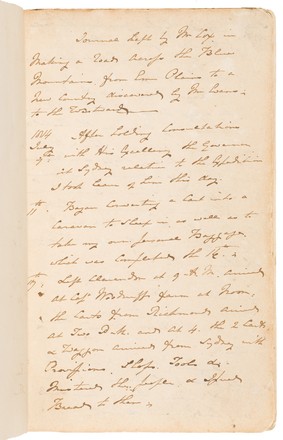
Journal kept by Mr Cox in making a road across the Blue Mountains from Emu Plains to a new country discovered by Mr Evans to the westward
7 July 1814 – 6 January 1815
C 708 / 2 (Safe 1 / 265)
Manuscript journal
C 708 / 2 (Safe 1 / 265)
Manuscript journal
In 1814, the engineer, government contractor, magistrate and pastoralist William Cox was commissioned by Governor Lachlan Macquarie to build a road across the Blue Mountains from Emu Plains to the Macquarie River. Cox mustered a team of eight guards and 30 strong convicts (of whom he promised their freedom at the end of the job) to build the road. Cox was accompanied by two Aboriginal men Colebee from the Darug Tribe and the Boorooerongal Clan and Joe from the Mulgoa Clan who acted as guides and translators for the Europeans.
On the 18th July, 1814 work began on the road at Emu Plains. It took four months to complete the road to Mount York, and another two to reach the Macquarie River, near present day Bathurst.
Cox kept this journal during the project. The Mitchell Library also owns a later ‘fair’ copy, which is a neater version of the diary that was written at a later date for the purposes of publication. Extracts from his journal were finally published as part of his Memoirs in 1901.


 Back to list
Back to list